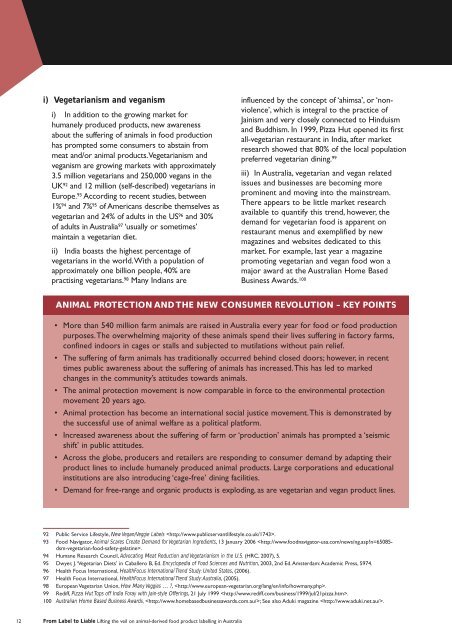From Label to Liable: Scams, Scandals and Secrecy - Voiceless
From Label to Liable: Scams, Scandals and Secrecy - Voiceless
From Label to Liable: Scams, Scandals and Secrecy - Voiceless
You also want an ePaper? Increase the reach of your titles
YUMPU automatically turns print PDFs into web optimized ePapers that Google loves.
i) Vegetarianism <strong>and</strong> veganism<br />
i) In addition <strong>to</strong> the growing market for<br />
humanely produced products, new awareness<br />
about the suffering of animals in food production<br />
has prompted some consumers <strong>to</strong> abstain from<br />
meat <strong>and</strong>/or animal products. Vegetarianism <strong>and</strong><br />
veganism are growing markets with approximately<br />
3.5 million vegetarians <strong>and</strong> 250,000 vegans in the<br />
UK 92 <strong>and</strong> 12 million (self-described) vegetarians in<br />
Europe. 93 According <strong>to</strong> recent studies, between<br />
1% 94 <strong>and</strong> 7% 95 of Americans describe themselves as<br />
vegetarian <strong>and</strong> 24% of adults in the US 96 <strong>and</strong> 30%<br />
of adults in Australia 97 ‘usually or sometimes’<br />
maintain a vegetarian diet.<br />
ii) India boasts the highest percentage of<br />
vegetarians in the world. With a population of<br />
approximately one billion people, 40% are<br />
practising vegetarians. 98 Many Indians are<br />
influenced by the concept of ‘ahimsa’, or ‘nonviolence’,<br />
which is integral <strong>to</strong> the practice of<br />
Jainism <strong>and</strong> very closely connected <strong>to</strong> Hinduism<br />
<strong>and</strong> Buddhism. In 1999, Pizza Hut opened its first<br />
all-vegetarian restaurant in India, after market<br />
research showed that 80% of the local population<br />
preferred vegetarian dining. 99<br />
iii) In Australia, vegetarian <strong>and</strong> vegan related<br />
issues <strong>and</strong> businesses are becoming more<br />
prominent <strong>and</strong> moving in<strong>to</strong> the mainstream.<br />
There appears <strong>to</strong> be little market research<br />
available <strong>to</strong> quantify this trend, however, the<br />
dem<strong>and</strong> for vegetarian food is apparent on<br />
restaurant menus <strong>and</strong> exemplified by new<br />
magazines <strong>and</strong> websites dedicated <strong>to</strong> this<br />
market. For example, last year a magazine<br />
promoting vegetarian <strong>and</strong> vegan food won a<br />
major award at the Australian Home Based<br />
Business Awards. 100<br />
ANIMAL PROTECTION AND THE NEW CONSUMER REVOLUTION – KEY POINTS<br />
• More than 540 million farm animals are raised in Australia every year for food or food production<br />
purposes. The overwhelming majority of these animals spend their lives suffering in fac<strong>to</strong>ry farms,<br />
confined indoors in cages or stalls <strong>and</strong> subjected <strong>to</strong> mutilations without pain relief.<br />
• The suffering of farm animals has traditionally occurred behind closed doors; however, in recent<br />
times public awareness about the suffering of animals has increased. This has led <strong>to</strong> marked<br />
changes in the community’s attitudes <strong>to</strong>wards animals.<br />
• The animal protection movement is now comparable in force <strong>to</strong> the environmental protection<br />
movement 20 years ago.<br />
• Animal protection has become an international social justice movement. This is demonstrated by<br />
the successful use of animal welfare as a political platform.<br />
• Increased awareness about the suffering of farm or ‘production’ animals has prompted a ‘seismic<br />
shift’ in public attitudes.<br />
• Across the globe, producers <strong>and</strong> retailers are responding <strong>to</strong> consumer dem<strong>and</strong> by adapting their<br />
product lines <strong>to</strong> include humanely produced animal products. Large corporations <strong>and</strong> educational<br />
institutions are also introducing ‘cage-free’ dining facilities.<br />
• Dem<strong>and</strong> for free-range <strong>and</strong> organic products is exploding, as are vegetarian <strong>and</strong> vegan product lines.<br />
92 Public Service Lifestyle, New Vegan/Veggie <strong>Label</strong>s .<br />
93 Food Naviga<strong>to</strong>r, Animal Scares Create Dem<strong>and</strong> for Vegetarian Ingredients, 13 January 2006 .<br />
94 Humane Research Council, Advocating Meat Reduction <strong>and</strong> Vegetarianism in the U.S. (HRC, 2007), 5.<br />
95 Dwyer, J. ‘Vegetarian Diets’ in Caballero B, Ed. Encyclopedia of Food Sciences <strong>and</strong> Nutrition, 2003, 2nd Ed. Amsterdam: Academic Press, 5974.<br />
96 Health Focus International, HealthFocus International Trend Study: United States, (2006).<br />
97 Health Focus International, HealthFocus International Trend Study: Australia, (2005).<br />
98 European Vegetarian Union, How Many Veggies … , .<br />
99 Rediff, Pizza Hut Tops off India Foray with Jain-style Offerings, 21 July 1999 .<br />
100 Australian Home Based Business Awards, ; See also Aduki magazine .<br />
12<br />
<strong>From</strong> <strong>Label</strong> <strong>to</strong> <strong>Liable</strong> Lifting the veil on animal-derived food product labelling in Australia


